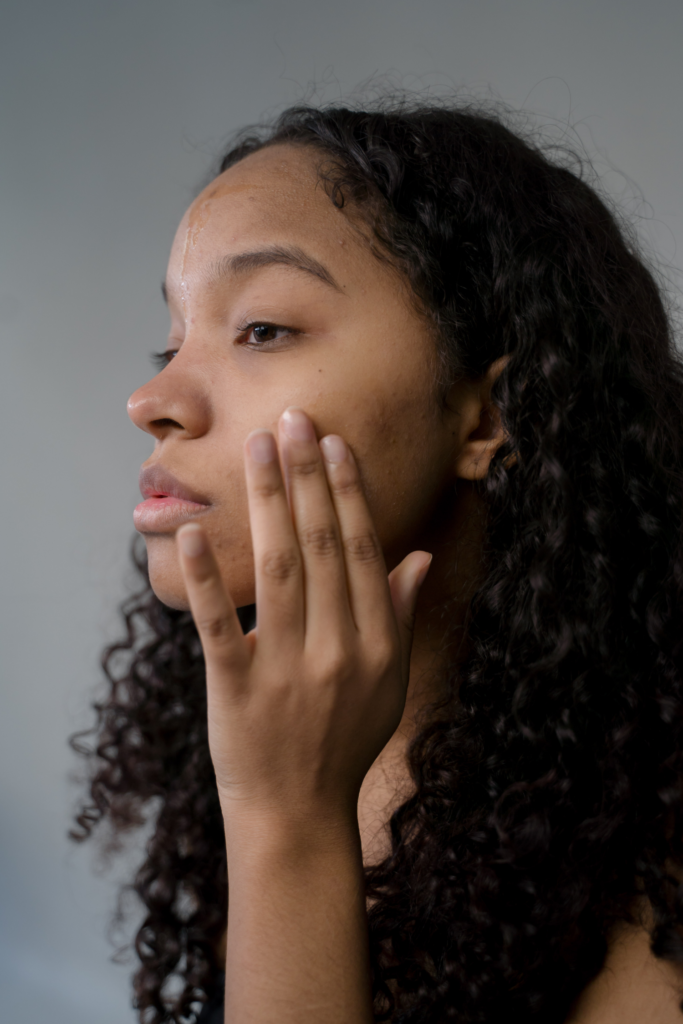Rosacea Isn’t Just Skin Deep: It Can Affect Confidence and Well-Being
Living with rosacea can be overwhelming. It’s not just about the visible redness, swelling, or breakouts—it’s the emotional toll of feeling self-conscious, frustrated, and, at times, defeated by each flare-up. You’ve likely tried multiple treatments, only to find that they offer temporary relief or come with unwanted side effects. And the unpredictability of rosacea can make it feel like a never-ending battle.
At Ridgetter.com, we understand how discouraging this can be. What makes our approach unique is that we gather the stories of real people who have successfully gotten rid of their chronic conditions through diet and lifestyle changes. This means that our advice isn’t based solely on theory but on real-life success stories of people who’ve walked in your shoes.
This isn’t just about reducing symptoms; it’s about regaining control of your skin, your confidence, and your life. Let’s dive into how you can do just that.

Can I Really Get Rid of My Kind of Rosacea?
Rosacea manifests in different ways. Here are the four common types of the condition:
- Erythematotelangiectatic Rosacea (ETR): This type involves persistent redness and visible blood vessels.
- Papulopustular Rosacea: Often mistaken for acne, it involves redness along with breakouts and swelling.
- Phymatous Rosacea: Causes thickened skin, often around the nose, resulting in a rough, bumpy texture.
- Ocular Rosacea: Affects the eyes, causing redness, irritation, and sometimes swollen eyelids.
No matter what type of Rosacea you have, one of the above, or another one – diet change will eventually help you clear your skin. Diet change addresses the root cause of the symptoms and helps the body deal with the issue from within.
Conventional Treatments: Why Don´t They Provide Lasting Results?
Dermatologists typically recommend conventional treatments such as topical creams, oral antibiotics, or laser therapy to manage rosacea. While these treatments may provide temporary relief, they fail to address the underlying causes of rosacea. Here’s why:
- They only target surface-level symptoms, not the root cause
- Some medications come with side effects that can worsen skin health or lead to new issues over time
- Treatments are often temporary fixes, requiring constant use for sustained results
If you’re tired of relying on short-term solutions, it’s time to consider a more long-term approach that targets the underlying issues driving your rosacea.
What are the Root Causes of Rosacea?
Both conventional and holistic perspectives have theories about the root causes of rosacea, although they offer no definite answer yet, as more research is needed. These are the theories so far:
Western Medicine’s Theories:
- Genetics: Rosacea often runs in families, pointing to a possible genetic factor
- Immune System Dysfunction: Some researchers believe rosacea involves an overactive immune response that triggers inflammation.
- Demodex Mites: These microscopic mites are found on everyone’s skin but exist in higher concentrations in people with rosacea, and some think they potentially aggravate symptoms.
Alternative medicine:
- Gut Health: Many rosacea sufferers report that their skin reacts to certain foods or digestive issues.
- Chronic Inflammation: Inflammation from stress, diet, or other lifestyle factors often triggers rosacea flare-ups.
- Food Sensitivities: Common dietary triggers like alcohol, spicy foods, and dairy can lead to flare-ups, making diet a crucial component of any treatment plan.
Food as Medicine:
The largest health movement curing disease with food as medicine, claims rosacea to be a variation of eczema. They further claim that both eczema and rosacea are caused by:
- an overburdened liver
- toxic metals (copper and mercury) in the liver
- in combination with a viral infection (most commonly Epstein Barr virus)
If the body was doing ok, it would filter the toxins out through the intestinal tract and kidneys. But when the virus is overloading the body, the toxins get spilled from the liver and end up in the skin, causing rashes. They believe that eczema, rosacea, and other skin conditions often run in families because family members can have similar exposures to toxins and viruses along with other factors like lifestyle. They claim that rosacea and eczema are not autoimmune conditions and that the body never attacks itself. Quite the opposite, that the body is putting down a tremendous effort to deal with the foreign invaders.
They also claim that both metals and viruses can be removed by the body if we give the body the right support. And that it therefore is possible to get rid of eczema completely over time.
Regardless of the cause, almost everyone agrees that diet and lifestyle changes can dramatically reduce the severity, discomfort, and frequency of eczema outbreaks.

Why Should Should You Trust Us?
So much advice on skin health. Who to listen to? At Ridgetter.com, our approach is different. Rather than offering cookie-cutter solutions, we gather and share the experiences of people who have successfully managed rosacea through diet and lifestyle changes. Their stories form the foundation of our advice, ensuring you get practical, real-world strategies that have been proven to work.
What makes our approach successful? We focus on sustainable changes that not only improve your skin but also enhance your overall well-being. These steps are designed to provide long-term results, not just temporary relief.
So let´s get down to what you can do today to start your journey to clear skin!
What Are The 5 Most Important Steps to Clearing Rosacea?
Like eczema and psoriasis, rosacea can be stubborn and needs time to improve. The approach is similar to clearing other serious skin conditions, and clear skin is possible over time. Here are the key steps based on real-life success stories of people who have managed to get rid of their rosacea:
1. Anti-inflammatory Diet:
Foods rich in antioxidants, such as leafy greens, help reduce inflammation. Base your diet around these foods and eat them in abundance.
- Leafy Greens: Spinach, kale, and arugula are rich in antioxidants. All leafy greens are amazing for skin health.
- Berries: Blueberries and raspberries are packed with anti-inflammatory properties and should be enjoyed every day.
- Fruits: Apples, bananas, papaya, pomegranate, and mango are high in nutrients that support skin health. Eat all the fruits you want several times a day.
- Vegetables: Potatoes, sweet potatoes, garlic, and other vegetables are powerhouses to make the body fight disease over time.
- Limit Alcohol and Processed Foods: These can trigger flare-ups for some people and do not support overall health.
2. Eliminate Trigger Foods
There is evidence suggesting a potential link between gluten, eggs, and milk with skin flare-ups, though it varies by individual:
- Gluten: Some people report improvements after going gluten-free, especially those with gluten sensitivity or celiac disease.
- Dairy: Dairy products exacerbate inflammation, leading to flare-ups.
- Eggs: Eggs can promote inflammation. Eliminating or reducing eggs might help manage eczema.
It’s important to note that these connections are not universally agreed upon in the medical community. But at Ridgetter.com we see clearly that eliminating them is an important factor among the people who have gotten rid of rosacea over time.
3. Prioritizing Hydration for Skin Health
Hydration plays a crucial role in overall well-being, and it’s especially important for maintaining healthy, resilient skin. Staying properly hydrated helps flush out toxins and supports the skin’s natural barrier. However, managing rosacea requires more than just drinking plenty of water. Individuals who have successfully alleviated their rosacea symptoms often incorporate these targeted hydration habits into their routines:
- Lemon water with raw honey: This combination provides hydration while delivering antioxidants that benefit both skin and overall health.
- Celery juice: Widely recognized for its potential to reduce rosacea symptoms, celery juice offers anti-inflammatory properties.
- Aloe water: Known for its soothing properties, aloe water can help calm irritated skin and support hydration from within.
- Cucumber juice: Drinking cucumber juice daily or several times a week promotes hydration and can help enhance skin clarity and reduce redness.
By focusing on these specific hydration habits, hundreds of people have found significant improvement in their skin’s appearance and overall health.
4. Stress Reduction
Stress is widely recognized as a significant trigger for rosacea flare-ups. Integrating stress-reducing practices such as yoga or meditation into your daily routine can play a key role in managing symptoms. While these practices don’t directly address the root cause of the condition, they can help your body cope more effectively, calming the nervous system and reducing the likelihood of flare-ups. In the long term, stress reduction contributes not only to clearer skin but also to overall well-being, making it a vital component of a comprehensive approach to managing rosacea.
5. Skincare Routine
A gentle, soothing skincare routine is essential for managing rosacea symptoms. Opt for fragrance-free, natural products designed for sensitive skin. Moisturizers that focus on hydration without harsh chemicals, and avoiding exfoliating scrubs or soaps that may irritate the skin, are key steps in preventing flare-ups. Although a skincare routine alone won’t address the root causes of rosacea, it provides crucial symptom relief, helping to maintain skin comfort while you focus on deeper, long-term solutions.
Herbal Face Food products are among the best for addressing rosacea. While diet changes are essential for tackling the root cause, the right skincare treatment can significantly soothe flare-ups. Even a small amount of a single Herbal Face Food product can outperform many other, often pricier, options. If this isn’t within your budget, opt for clean, natural alternatives. Remember, the journey to clear skin starts from within—what you eat plays the most critical role in reducing rosacea over time.

Maria’s Success Story: Overcoming Rosacea and Gaining Confidence
For Maria, rosacea was more than just a skin condition—it impacted her confidence and how she saw herself in the mirror. After years of trying topical treatments and feeling frustrated by flare-ups, she decided to take a different approach. By gradually eliminating food triggers, incorporating a diet of anti-inflammatory foods, and adopting a stress-reduction routine, Maria started to see noticeable improvements.
It wasn’t just her skin that transformed; her mindset did too. As her flare-ups became less frequent, Maria’s confidence grew, and she realized that overcoming rosacea was about more than just her skin—it was about taking back control of her life and health.
What supplements help clear rosacea?
There is a lot of misinformation about supplementation for rosacea. These are the supplements proven by rosacea survivors that will help you clear your skin. These supplements can provide essential support for the immune system, help reduce inflammation, and promote clearer skin over time. Drawing from both research and real-life success stories, we’ve identified key supplements that have shown great promise in improving rosacea symptoms:
- Zinc: A powerful immune booster, zinc helps reduce inflammation and supports skin repair, making it an essential supplement for improving skin health.
- Vitamin C: Known for its antioxidant properties, Vitamin C enhances the immune system, reduces oxidative stress, and promotes skin regeneration, helping to address rosacea symptoms.
- Lemon Balm: This calming herb is renowned for its ability to reduce stress and inflammation, which in turn supports overall immune function and skin health.
- B12 (Adenosylcobalamin and Methylcobalamin): These active forms of B12 are crucial for maintaining nerve and blood cell health. By supporting energy levels and reducing fatigue, B12 assists the body in managing stress and promoting recovery.
- Licorice Root: With its anti-inflammatory and immune-modulating properties, licorice helps soothe flare-ups and minimize rosacea symptoms.
- Cat’s Claw: A powerful herb known for its anti-inflammatory benefits, Cat’s Claw supports immune health and helps combat systemic inflammation, making it a valuable ally in managing chronic skin conditions like rosacea.
These supplements are amazing when fighting rosacea. Start with one or two in small amounts, and rotate over time. Always ask your doctor before changing your diet or starting a supplement.
Look for supplements without additives, alcohol, or preservatives. We highly recommend Vimergy for the cleanest and most powerful products.
How Long Does It Take to See Results?
The timeline for seeing improvements in rosacea can vary greatly from person to person, but many individuals begin to notice visible changes within 4 to 8 weeks of making targeted dietary adjustments. However, it’s important to remember that rosacea is a complex condition, and progress will be gradual over time. Some may experience initial improvements in skin texture or reduced flare-ups, while more significant changes, such as clearer skin and reduced redness, may take a few months or even longer. Do the work, and the results will come eventually.
Consistency is key. Sticking to dietary and lifestyle changes, along with proper skincare routines, can lead to long-lasting results. Setbacks will normally occur and are a part of the journey to better skin health. Patience and persistence are essential—true transformation comes from giving your body the time it needs to adapt and do the work needed to combat rosacea.

How Can I Stay On Track And Keep My Motivation Through Ups and Downs?
When it comes to managing rosacea, there is no quick fix. However, the stories we’ve gathered show that diet and lifestyle changes can provide lasting relief. The journey might take time, but the results are worth the effort. And there is no other way to magically clear your symptoms with lasting results. Imagine a skin without rosacea. Clear skin is within reach, and it’s about more than just reducing flare-ups—it’s about regaining your health confidence and peace of mind.
At Ridgetter.com, we know the importance of staying motivated through the ups and downs, and we’re here to help you every step of the way.
One of the most powerful tools we offer is our weekly newsletters, filled with expert tips, and real-life success stories. These newsletters remind you that you’re not alone and that lasting results are within reach. Knowing others have overcome rosacea through similar changes can help you stay committed, even on tough days.
We also provide motivational videos to help you stay on track. Our step-by-step guides break down essential actions you can take—whether it’s changes in diet, skincare, or supplements. These guides simplify your path, offering clear, actionable advice to help you stay on track and see real progress.
At Ridgetter.com, we’re committed to helping you achieve clearer skin and renewed confidence. With our resources and support, you can stay on track, keep your motivation strong, and see real, lasting results.
Start Your Journey To Clear Skin Today
Ready to take control of your rosacea?
Sign up for our newsletter to receive step-by-step guides, motivation, and success stories from people just like you.
Let us help you navigate your journey toward clearer skin and a more confident you.
👉 Sign up today and take the first step toward lasting change!

